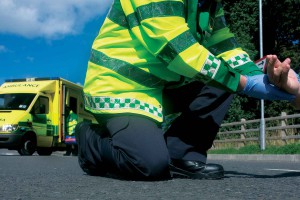24th April 2015
 The Northern Ireland Ambulance Service is facing more than two weeks of industrial action from Monday 27 April 2015, in addition to action already being taken by NIPSA which commenced at the beginning of April.
The Northern Ireland Ambulance Service is facing more than two weeks of industrial action from Monday 27 April 2015, in addition to action already being taken by NIPSA which commenced at the beginning of April.
UNISON and GMB trade unions have informed the Trust that they will be advising their staff to work to contracted hours only from that date. The UNISON action will finish on 10 May and GMB will complete their action the following day.
Additionally the UNITE trade union has advised NIAS of their intention to withdraw labour for a 24 hour period on 6 May.
How will this impact on NIAS’s ability to deliver a service?
Working to contracted hours will reduce our capacity to respond as staff are being asked by Trade Unions not to work voluntary overtime. As a result of the withdrawal of labour by UNITE staff on 6 May 2015, NIAS anticipates that there will be an impact on the frontline but also within the Control room.
What will this mean for those who have need of the service?
In relation to the “working to contracted hours only” NIAS anticipates that this will impact on our ability to respond to calls as quickly as we would like and that a backlog of calls may build up.
In relation to the day of action on May 6, the Trust anticipates that there may be delays in answering calls in the control centre which will have a knock on impact on the despatch of ambulances.
What advice can NIAS provide to the public for this period?
The most important advice is that, at all times but particularly over this period, people should only use 999 when they really need it.
NIAS will continue to prioritise calls and will respond first to those with the highest clinical need.
Before calling 999, we would ask the public to consider:
• Visiting a pharmacy
• Contacting a GP
• Using “out of hours” services
• Using Minor Injury Units
• Making their own way to the Emergency Department if appropriate
When would NIAS advise patients to phone 999?
NIAS would advise patients to call 999 especially, but not exclusively, in cases of:
• Unconsciousness
• Severe blood loss
• Chest pain
• Breathing difficulties
• Severe burns or scalds
• Fitting
• Choking
• Drowning
• Severe allergic reactions
For more information, please visit our ‘Calling 999‘ page.
Is it possible that calls may not be responded to?
NIAS will seek to respond to all calls from the public. However due to the prioritisation process applied there may be delays for those less clinical urgent calls which we appreciate may cause distress to those involved including elderly people who may have fallen, some young children with broken bones or people who may have been involved in road traffic collisions and have not suffered serious injury.
